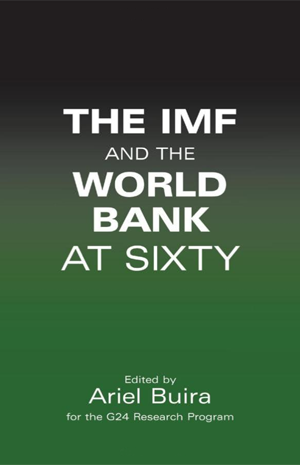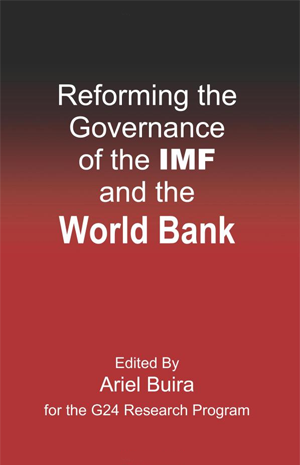Books

Reforming the International and Financial System for Development
By Jomo Kwame Sundaram
The fundamental questions about economic policy discussed in this book are key to the future. If real progress is to be made on issues from financial regulation to the international monetary system, the proposals in this book deserve serious attention. This book served as initiative for policy dialogue. (Kemal Dervis, vice president, Global Economy and Development, Brookings Institution, and former administrator of the United Nations Development Program)
The 1944 Bretton Woods conference created new institutions for international economic governance. Though flawed, the system led to a golden age in postwar reconstruction, sustained economic growth, job creation, and postcolonial development. Yet financial liberalization since the 1970s has involved deregulation and globalization, which have exacerbated instability, rather than sustained growth. In addition, the failure of Bretton Woods to provide a reservecurrency enabled the dollar to fill the void, which has contributed to periodic, massive U.S. trade deficits.
Our latest global financial crisis, in which all these weaknesses played a part, underscores how urgently we must reform the international financial system. Prepared for the G24 research program, a consortium of developing countries focused on financial issues, this volume argues that such reforms must be developmental. Chapters review historical trends in global liquidity, financial flows to emerging markets, and the food crisis, identifying the systemic flaws that contributed to the recent downturn. They challenge the effectiveness of recent policy and suggest criteria for regulatory reform, keeping in mind the different circumstances, capacities, and capabilities of various economies. Essays follow ongoing revisions in international banking standards, the improved management of international capital flows, the critical role of the World Trade Organization in liberalizing and globalizing financial services, and the need for international tax cooperation. They also propose new global banking and reserve currency arrangements.



The IMF and the World Bank at Sixty
Edited by Ariel Buira-June 2005
“Incisive and precalculating the World Bank and the IMF is a unique book, providing the reader with a collection of highly professional papers from the perspective of developing countries, covering their economic problems and their relations with International Financial Institutions.”
~Claudio M Loser, Inter-American Dialogue
“This is a very refreshing and through critique of today’s development orthodoxy represented by the World Bank and the IMF. The combination of iconoclastic perspectives and detailed knowledge of the subject matter makes it particularly powerful”
Ha-Joon Chang, Assistant Director of Development Studies, University of Cambridge, UK
“This is a challenging and timely book by a distinguished cast of scholars, analysing the philosophy, governance, political economy and effectiveness of the two premier global economic institutions. It robustly criticizes their unquestioning reverence for free markets, their political economy and governance, and their methodology and effectiveness. Of the recent analysis of the two institutions, this is clearly one of the most rigorous, balanced and coherent. A “must” for development specialists and students.”
~Sanjaya Lall, Professor of Development Economics, International Development Centre, Oxford, UK



Edited by Ariel Buira-June 2003
Forward by Dani Rodrik
“The contributors to this volume provide cogent arguments for substantial
reforms, not only to the IMF and World Bank, but to the entire financial system, to make it less prone to crisis and more supportive to developing countries.”
~Roy Culpeper, Ph.D., President and CEO, The North-South Institute
“These ‘voices of the poorer’ are excellent challenges and extensions of present development thinking, whether they are concerned with debt management in developing countries, with conditionalities of the IMF or (my favourite) industrial competitiveness.”
~Jozef Ritzen, President of the Univeriteit Maastricht and former Vice President of the World Bank’s Development Economics Department (2001-3)
“It will supply ammunition to all those skeptical about the benefits to developing countries of current global economic policies and institutions. It will also be useful reading for courses on global governance, development economics, and international finance.”
~Professor Michael J. Ellman, Department Chair, Economics, Faculty of Economics and Econometrics, University of Amsterdam, The Netherlands.



Reforming the Governance of the IMF and the World Bank
Edited by Ariel Buira 2005
“The essays by experts collected in this volume clarify the positions of developing countries. They constitute an invitation to experts in the industrial countries and the European Union to further enrich this debate.”
~Leo van Houtven, Former Secretary and Counselor, IMF
“The essays provide hard ammunition for the debate about what exactly should be done.”
~Robert Hunter Wade, Professor of Political Economy, Development Studies Institute, LSE
“This timely volume directs attention to the unreformed governance structures of the twin organizations, reflected among other things by the way they still select their leaders, and by their unbalanced voting procedures.”
~Laurence Whitehead, Official Fellow in Politics, Nuffield College, Oxford

